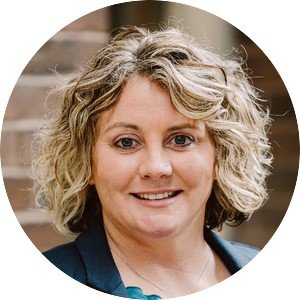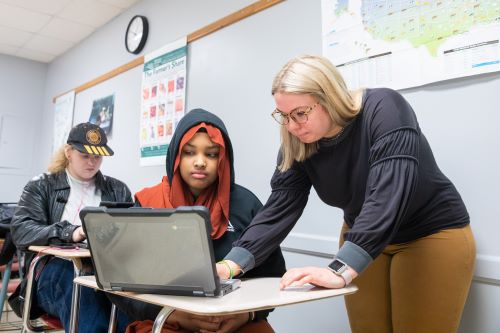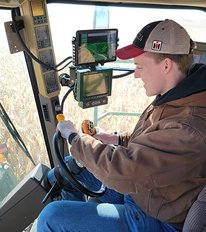
Agricultural education teachers are in high demand – both in and out of the classroom
On average, 92 percent of University of Minnesota graduates find immediate career placement within the agricultural education profession
When Liz Knutson presents to a group of people at work, she leans heavily on skills she developed studying agricultural education at the University of Minnesota. It’s where she learned how to set direction and expectations, to command a room, and to galvanize an audience to act. While student teaching is where she honed these skills, they’ve proven invaluable in the corporate world.

“I’m better because of the time I spent working with high school students in the classroom,” said Knutson, who joined Corteva Agriscience after graduating with her teaching license in 2014. She now serves as Pioneer soybean marketing leader for the U.S. “The ag ed major made me more versatile and, I believe, a more marketable potential employee.”
Part of the College of Food, Agricultural and Natural Resource Sciences (CFANS), the agricultural education major prepares students for a variety of careers in the agricultural community through hands-on classes, highly applicable course material and a supportive network of staff and alumni.

“Through early field experiences, internships and student teaching, ag ed students are able to try on different options to find their career fit,” said Amy Smith, associate professor of agricultural education at CFANS and major coordinator. “By graduation, they typically have their career path identified, whether that leads to a classroom, county extension office or the corporate world.”
Smith says that over the past three years, 92 percent of UMN undergraduate students who completed the agricultural education program immediately accepted employment within the profession. For those who did not, the primary reason was geographic limitations.
Soaring classroom demand
For agricultural education students destined for a middle or high school classroom, there is no shortage of opportunities across the country. According to the National Association of Agricultural Educators, there are currently not enough agriculture teachers in the U.S. to meet the growing demand.
“In many cases, demand is coming from school districts wanting to expand existing ag ed programs or start new ones,” said Smith. “At the same time, due to teacher shortages in other areas of career and technical education, some schools are leveraging the versatility of an ag ed curriculum to address topics often included in family and consumer science education or technology education.”
This growth is evident at Mankato Area Public Schools in southern Minnesota. After more than 30 years without an agricultural education program, the district started its current program in 2019 when it hired CFANS grad Ethan Dado. It quickly grew from one introductory course that enrolled about 40 students to nine diverse courses with over 400 students enrolled today. Robin Tidd joined the district as an agriculture, food and natural resource teacher in 2021 after graduating from CFANS.

“One reason the program came back here was because of community support,” said Tidd. “They saw how many jobs we have in Mankato that relate to agriculture, and we weren't training high school students in that area. Now we’re introducing hundreds of students each year to agriculture education and all of the possibilities within it.”
Ag ed takes root in urban schools
The demand for agricultural education teachers extends to many urban areas, where CFANS alumni like Harley Braun are challenging dated perceptions of agricultural education.
Braun grew up in a small town in Minnesota, but after studying agricultural education with a minor in Racial Justice in Urban Schooling, she was inspired to teach agricultural education at Highland Park High School in St. Paul, Minnesota.
“No matter where you live, students are concerned about the environment, climate change and the food we eat,” said Braun, who has been teaching for three years. “Young people care about the world and want to make it a better place, and agriculture gives them a way to do that.”
She says one of the biggest misconceptions she encounters in her profession is the belief that city kids don’t have a connection to agriculture.

“That’s really not the case,” said Braun. “Many of my students have family members who work in agriculture, whether they are living in another country or right here in Minnesota. Likewise, just because someone grows up in a rural area doesn’t mean they have a background in agriculture. The truth is, we’re all connected to ag in ways we might not immediately realize.”
‘A place for everyone in agriculture’
It’s a conundrum that Smith has faced throughout her academic career: agricultural education is everywhere, but do people see themselves in it?
“There is a broad array of subjects that fall under the agriculture umbrella, such as biotechnology, environmental services, and food products and processing, just to name a few,” she said. “Many people don’t realize that the subjects they are passionate about teaching are actually agriculture, just called something else.”

The agricultural education program at CFANS continues to evolve to meet that challenge, most recently with the addition of a minor and a new master’s degree. As the program has expanded, one thing has stayed the same: a personalized approach to supporting students.
“We’re a smaller major but that’s part of what makes it so great because we’re tight knit,” said Noah Erickson, a UMN sophomore who grew up on a farm in Minnesota. He’s not yet sure of his career aspirations, but he’s confident the CFANS agricultural education program will prepare him for what’s next.
“There’s a place for everyone in agriculture,” he said. “I know that the versatility of this major will help set me up for success.”
Interested in a career in agricultural education? Find out more about this rewarding career pathway.





